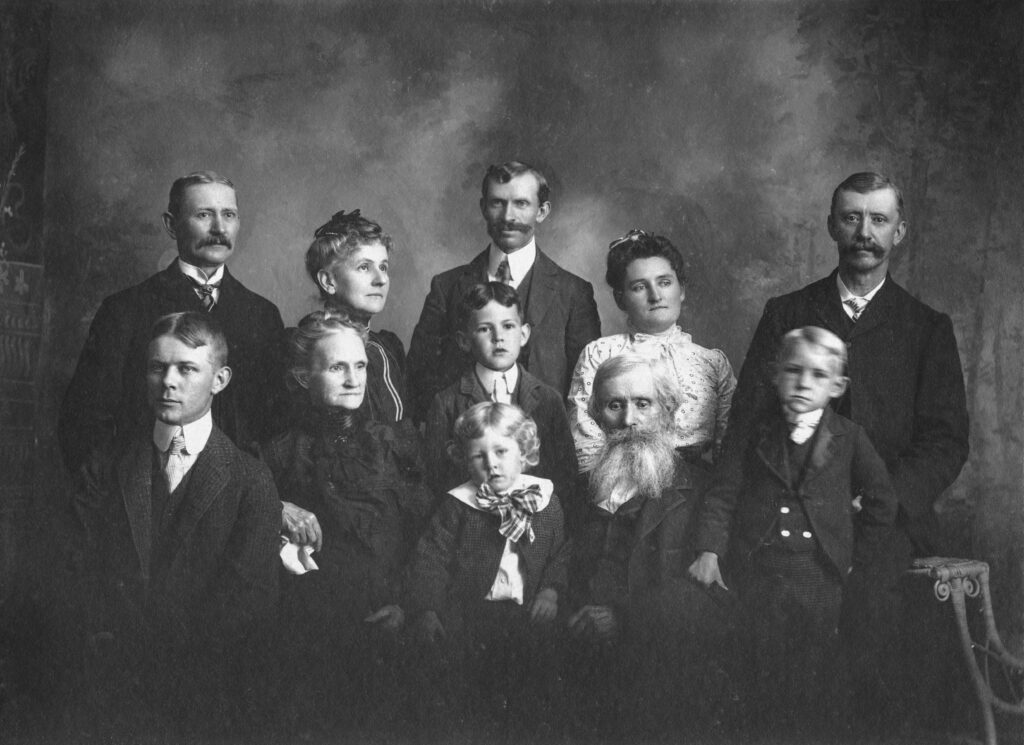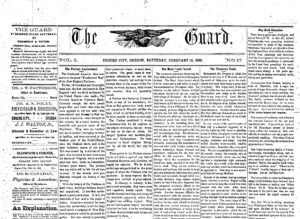Several Eugene papers had short-lived histories

1867-1877
Stand on the corner of Seventh Avenue and Willamette Street, Doc’s Pad bar behind you, the concrete and glass facade of the Hult Center in front of you, and imagine him somewhere nearby.
He’s inside a white clapboard house along a muddied Willamette Street. A sign on the outside says “Guard Office.” He is assembling Page One of the first edition, starting something that is still going 150 years later.
His name is John Brown Alexander, although most call him J.B. He is 47 years old. He has a beard. He has a dream – to own and operate his own newspaper.
That he accomplished, but not for long.

After having started the short-lived Eugene City News a year earlier, Alexander launched The Guard in what was then Eugene City on June 1, 1867.
But he owned the four-page paper – published on Saturdays during its first 24 years, before becoming a daily newspaper in 1891 – for just 16 months.
An annual subscription and a single front-page ad square both cost the same in 1867 – $3.
The Oregonian, born 16 years earlier, in 1851, was not overly impressed:
The first number of a paper called The Guard, published at Eugene City, has made its appearance. It is intensely Confederate, and we can see little use for such political papers since the surrender of Mr. Lee. The Guard may, however, be useful in other respects, and our hope is that it may be successful according to its deserts.
– The Oregonian, June 4, 1867
As shocking as it seems today – especially in liberal Eugene – The Guard in its early years supported the rights of Southern states to own slaves and editorialized that freeing them was an unwise thing to do.
“Do you desire this to be a white or a mongrel country?” asked a small item of typically racist propaganda in the July 27, 1867, issue.
“The Guard started as a rabid anti-Reconstruction, anti-Radical sheet,” wrote the late Warren Price, a longtime University of Oregon journalism professor and author of the 1976 book “The Eugene Register-Guard: A Citizen of its Community.” Many new Oregon residents had come from Missouri, where slavery had been legal before the Civil War, Price added.
Alexander was born in 1820 in Illinois and came to Oregon in 1852, according to Price’s book. A 1942 Register-Guard story on the newspaper’s 75th anniversary said that, according to former UO School of Journalism Dean George Turnbull’s 1939 book, “History of Oregon Newspapers,” Eugene’s first newspaper, in 1856, was Alexander’s “The News.” But it existed only that year to track election campaigns.
Several other Eugene newspapers had short-lived histories before The Guard made its appearance, including The Pacific Journal (1858), The People’s Press (1859), the State Republican (1862), the Union Crusader (1863) and the Oregon State Journal (1864).
Only the Oregon State Journal, run by Harrison Kincaid, a future Oregon secretary of state (1895-1899), was still operating by the spring of 1867. (It would survive until 1909.)
Ads dominated The Guard’s early front pages, pitching everything from general merchandise at Walton & Son to booze at the Lager Beer Saloon. Most local news stories were short pieces such as this one from July 13, 1867:
“ASSAULT: Our sanctum was invaded yesterday by a small boy armed with a huge bucket of Lager, from ‘Louy’ of the Eugene City Brewery. We called our forces together and made a furious charge upon the youthful warrier [sic], who dropped his weapon and incontinently fled. You bet we had friends while that lager lasted. A thousand thanks, Louy, may you live a thousand years and ‘your shadow never grow less,’ Try it again, we ar’nt a bit mad.”
Alexander sold The Guard in October 1868 to a local politician named J.K. Skaggs, who would own it for just five weeks.
Skaggs would turn around and sell to one of his printers, 22-year-old William Thompson, whom Price describes as not only an adventurer but an “Indian fighter” as well. Skaggs would sweeten the deal by throwing in two cords of wood.
“After I had worked there about two weeks the proprietor (Skaggs) said to me, ‘I can’t make the paper go,” Price quotes Thompson, based on an interview Thompson gave toward the end of his life. “It will give me a black eye if the paper suspends publication while I am the owner. If you will take it, I will give you not only the Washington hand-press and the type, but I will give you two bundles of paper and two cords of wood.”
Thompson, who operated the paper with another printer, William Victor, waged one of the Guard’s first successful editorial campaigns, demanding that Eugene City build a new schoolhouse after a skunk’s rummaging around inside left such a stink the building was uninhabitable. Despite the loss of some advertising by businessmen concerned about higher taxes, Thompson won out and a new school was built.
He sold the paper to George Buys and A. Eltzroth, according to Price, in December 1869.
Buys changed the paper’s name to The Eugene City Guard, running these words that would stay underneath the nameplate of the weekly, into the 20th century, even after the Guard began a daily edition in 1891:
“Established for the dissemination of Democratic principles and to earn an honest living by the sweat of our brow.”
Buys would own The Eugene City Guard for what, back then, seemed an eternity: eight years. He would oversee the coverage of stories such as the arrival of the Oregon and California Railroad in 1871, the opening of the University of Oregon in 1876, and the building of the first Ferry Street Bridge, also in 1876.
Mark Baker, who researched and wrote the stories for this special section, is a former Register-Guard reporter and a member of the third generation of the Baker family.

Mark Baker has been a journalist for the past 25 years. He’s currently the sports editor at The Jackson Hole News & Guide in Jackson, Wyo.
